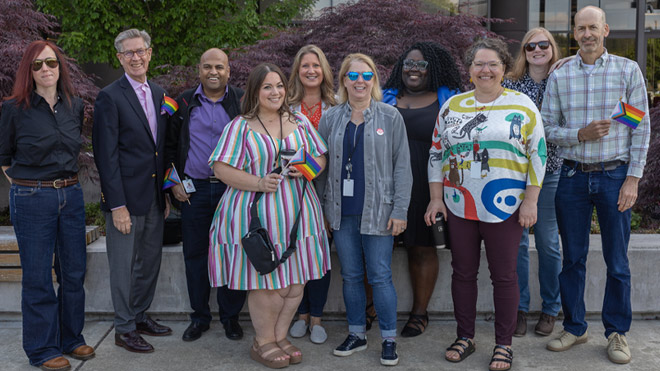
LGBTQ+ Couples Plan for Kids and the Future
For LGBTQ+ couples, navigating family finances can come with extra challenges. LGBTQ+ employees at BECU share their experiences and reflections about creating financially sound and legally protected families.
Statistics suggest LGBTQ+ people are finding ways to overcome the financial challenges of starting a family and planning for the future.
An estimated 63% of LGBTQ+ millennials are considering starting or expanding their family in the years ahead, according to the Family Equality Council. In Washington, 28% of LGBTQ+ people have children, according to LGBTQ+ data and demographics from the UCLA Williams Institute. Children may be from an earlier relationship, adoption or pregnancy through surrogacy, IVF or other fertility services.
Some LGBTQ+ BECU employees describe their experiences and decision process around marriage, kids, estate planning, education planning and retirement.
Making the Marriage Decision
When Debbie W. wanted to marry Karen in 2001, gay marriage wasn't legal yet. So, the couple held a commitment ceremony, surrounded by supportive friends and family, including Karen's adult son.
They formalized their commitment with the state in 2013, after it was legalized in Washington. But they declined to pursue domestic partnership.
"Without gay marriage as an option, we felt like domestic partnership was in a way legalized discrimination, because it didn't include some of the same protections or benefits as legal marriage," said Debbie, BECU's Cooperative Community Advocate in Social Impact.
In 2015, the U.S. Supreme Court's 5-4 ruling in Obergefell v. Hodges found that same-sex couples have a right to marry, guaranteed by the Constitution under the due process clause and equal protection clause. Later, in 2022, the bipartisan Respect for Marriage law enshrined the statutory authority for same-sex and interracial marriages.
Before 2015, the right to marry varied by state. Domestic partnership often didn't bestow the same legal and financial benefits and protections as marriage, Debbie noted, particularly if either partner died.
After their legally recognized marriage, Debbie and Karen could benefit from Washington's community property laws, file taxes jointly, and ensure access to each other's retirement benefits, Social Security benefits, and other legal rights and services.
As of 2019, overall, about 58% of couples in the nation's 980,000 same-sex households were married, while 42% were unmarried partners, according to a 2021 Census report.
"Getting married is one of the largest financial decisions you will make — it's not a very romantic thought, but it's the reality," said Liz H., director of BECU User Experience Research and Design, who is married to wife Pockets. "Tremendous tax benefits go to those who are married and file jointly."
Fertility Services
Many LGBTQ+ couples may turn to fertility services to have a baby, which can quickly add up.
Multiple rounds of fertility treatment can easily lead to bills of $50,000 or more, and surrogacy can run up to $250,000, according to Family Equality Council, an organization advocating for LGBTQ+ families. Not all employers or insurance companies cover infertility treatments or all types of fertility treatment. For example, while 23 states require fertility coverage, only 14 require IVF coverage. Even fewer states feature language that is inclusive of LGBTQ+ people in infertility mandates.
Member Consultant Lead Nakia C., 29, is a parent to Colbie, 11, and Archer, 11 months. She was married for five years until her wife's death in November 2023.
Nakia's wife had carried Colbie and didn't want to carry any more children, but Nakia looked forward to the pregnancy experience. The couple worked with a fertility clinic to use the same donor that had led to Colbie's birth.
"It's so much work," Nakia said. "We took out a loan and used our credit card to purchase the medication. When I first called to get my quote on how much it would be, they said $32,000. I cried. I thought there was no way we would be able to pay. That was just for medication."
Even after insurance stepped in, the couple ended up paying $3,000 out of pocket for medication and $5,500 for a round of IVF.
"IVF is a very intense process," Nakia said. "Overall, I had over 100 injections I had to do myself, on top of countless other tests and blood tests."
Then, because the sperm donor was known, the fertility clinic required an attorney and contract for another $1,000, in addition to therapy sessions — one for the couple, one for the donor alone, and then all three together.
Luckily, Nakia and her wife only had to go through one round of IVF and received six embryos and one successful transfer, leading to Archer.
"After everything I've been through, my kids are everything." Nakia said. "Archer brings light into all our lives. He's a bundle of joy for my family and everyone he meets. Going through the experience of IVF and parenting of a newborn is not an easy task. But if growing your family is what you dream of, raising another human and watching them grow and discover the world is truly an amazing gift. I will forever be grateful that I was able to get through all the hoops and be a momma."
Tip: Some limited financial assistance is available via LGBTQ+ Family Building Grants.
Adoption
Adopting a baby costs up to $45,000 domestically and $70,000 internationally, according to Family Equality Council. LGBTQ+ families face more barriers when trying to adopt internationally, as same-sex couple adoption is only legal in 38 nations.
Five years into marriage, BECU Operations Support Specialist Tanner A. and husband Kermit felt ready to start a family through adoption. The couple had to pay everything up front, with some amount reimbursed later by an IRS adoption tax credit and a workplace-sponsored adoption reimbursement.
The adoption agency worked well with LGBTQ+ couples, and helped Tanner and Kermit meet several potential birth mothers. Then, the couple's social worker described a small agency in another state seeking a biracial or gay family for a baby on the way — the birth parents felt such a family would best understand their child's unique experiences. It felt like a perfect match but required starting over with a new agency and paying new fees.
"Our patience paid off," Tanner said of the 18 months that elapsed for the adoption process. "We adopted our beautiful daughter, Reese, who is now almost four years old. Every day with her is a blessing filled with laughter and love. Looking back, any challenges we faced seem small compared to the joy of being her parents."
Love, chosen family, and community support were critically important, Tanner noted: "As our daughter grows, we want to teach her about kindness, diversity and acceptance. She brings so much light to our lives, and we are so grateful for the journey that brought her to us."
LGBTQ+ Families and Custody
When thinking about marriage, Liz H. also encourages LGBTQ+ couples to think through all the scenarios of where to live, especially when planning to have kids.
Liz and Pockets wanted to be deliberate about which state to marry in. They chose to marry in New York State in 2014, before Obergefell. By marrying before having children, both mothers' names would go on the birth certificate, and New York State presumes the couple are the parents, Liz noted: "Therefore, we knew we had to be married before having any kids."
In Washington, state law presumes both adults are parents to a child born during a marriage or domestic partnership or within 300 days after the marriage or domestic partnership ends.
However, simply being listed as a parent on the birth certificate may not provide sufficient proof of parentage in some states or internationally, particularly for a person who is not the biological parent.
"Second-parent adoption for my wife is still, unfortunately, something we will need to pursue due to the uneven legal ground of the non-biological parent's rights in states that are not as liberal on these policies," Liz said.
Second-parent adoption or co-parent adoption can help prevent future custody disputes, streamline inheritances, and resolve legal situations in states and nations that are less friendly to LGBTQ+ people. Court-ordered adoption judgments are final. However, depending on the state, the second-parent adoption process can include background checks, supporting documentation, home studies and a court hearing.
"It is frankly insulting and expensive to go through this process," Liz said. "You have to go through a family study to ensure you are a 'fit parent' for the child that is already yours, just due to not being the biological parent."
Some states have simplified and streamlined the process for parents who use assisted reproduction services. But challenges can still remain, particularly if a couple isn't married. For example, Washington doesn't allow second-parent adoptions for unmarried couples.
Estate Planning for LGBTQ+ Families
The full estate planning process includes naming beneficiaries on accounts, determining guardianship for minor children, buying life insurance, drafting wills, and selecting someone to make health and financial decisions if you become incapacitated or pass away.
Around 42% of those identifying as LGBTQ+ report owning life insurance, compared with 52% of the general population's ownership rate. Debbie and Karen have life insurance through BECU's group life insurance offerings, and Debbie has extra coverage as well.
For Debbie and Karen, there's a 9 1/2-year age difference to consider when planning retirement, and for end-of-life potential needs.
Naming account beneficiaries is especially critical, even with legal marriage, Debbie said: "Especially given all the negative bills that have been filed in states trying to undo LGBTQ+ protections and inclusions and some noise about hoping they can overturn legalized gay marriage."
The couple has legal documents to protect each other should one person die, become incapacitated or become ill.
"Keeping wills, beneficiaries, and powers of attorney, joint tenant with right of survivorship as well, is critical in a gay marriage," Debbie said. These tools help the surviving spouse care for their partner's health and financial assets during illness and after death.
Debbie and Karen are currently updating wills and considering a trust. "You never know who may try and contest it. It can sometimes be people who you wouldn't expect, not that we anticipate any of that as we have such strong support." Debbie said.
"However, death tends to bring out the emotional and unexpected," Debbie said. "Someone may feel left out, somehow wronged, or otherwise overwhelmed with grief, and could act in unexpected ways or want to supersede our relationship's legal and emotional ties. So, it's always important to have things in place that spell out and protect your wishes. That is true in any situation, and especially true in gay marriages."
Amanda G., a BECU Member Consultant II, has found the estate planning process challenging. "To the best of our knowledge, we are the first LGBTQIA+ people in either of our extended families, and we are also parenting our children very differently than we were parented ourselves," Amanda said. She and her wife are taking less of an authoritarian approach to raising their kids.
Amanda is married to Josie, and the couple has two children. "My wife came out as transgender while we were living on a homestead in rural Missouri and homeschooling our young children," Amanda said. The married couple decided to sell the home and acreage and move 2,000 miles back to Washington (where both grew up) in 2022.
"We did not have access to transgender healthcare, affirming therapists, and other support that our family was going to need to navigate this journey," Amanda said. "These changes stressed our finances and required flexibility to navigate. In the process, we chose to put other financial goals on hold for a short time while we adjust."
"We are still working on choosing someone whom we feel confident would raise our children in a way the kids are used to," Amanda said. "This feels incredibly important to us as that person would likely also become the primary person to support our children through the loss of their parents. We need to get over this hurdle so we can complete our estate planning."
Saving for the Future
At this point, Amanda and Josie have no education savings for their kids and little retirement savings for themselves as they struggle to manage student debt, the cost of accessing transgender healthcare for Josie, and supporting a family in a high cost of living area.
"We are hopeful that we will be able to prioritize retirement savings in a handful of years after taking care of some healthcare needs and paying down high-interest debt," Amanda said.
Liz and her wife are balancing education savings for their kids, Liz's hefty student loan payments, and 401k investments for retirement.
"I do not want my kids to have the same burden of educational loans that I am currently dealing with," Liz said. "I intend to either push them to go to a college where residency results in a free education, such as New York State or Germany, or take the loans on myself so they're not burdened with educational debt."
"It is important for LGBTQ+ families to be adaptable, flexible and ready to pivot if needed," Amanda said. "Things outside our control can change very quickly, and this may require us to utilize more financial resources or impact the way we spend and save."
The above article is intended to provide generalized financial information designed to educate a broad segment of the public; it does not give personalized financial, tax, investment, legal, or other business and professional advice. Before taking any action, you should always seek the assistance of a professional who knows your particular situation when making financial, legal, tax, investment, or any other business and professional decisions that affect you and/or your business.


